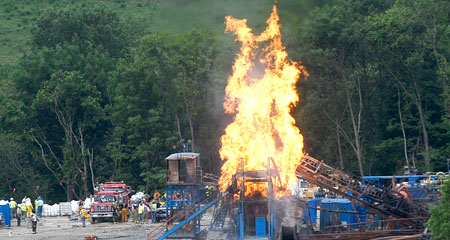By Alyssa Bernstein
This piece was published earlier as a letter to the editor in the Athens News, Feb. 8, 2012.
The Athens County Commissioners, who may soon vote on a proposed resolution regarding fracking (the oil and gas drilling method that in its relatively new horizontal application fractures deep layers of shale by injecting massive amounts of toxics-laced water at high pressure), have said that they are working to find a compromise that balances economic and environmental interests, according to a Feb. 2 report in The Athens NEWS.
The simple belief that fracking creates an opposition between economic interests and environmental interests, which many people hold, seriously distorts the realities and leads to seriously wrong decisions. The conflict in Athens County is between some residents’ economic interests, which depend on preserving the county’s clean water, air, soil and ecosystems, and other people’s economic interests, which they want to advance in ways that will, foreseeably if not intentionally, harm other residents in both the short and the long term. Continue reading →










